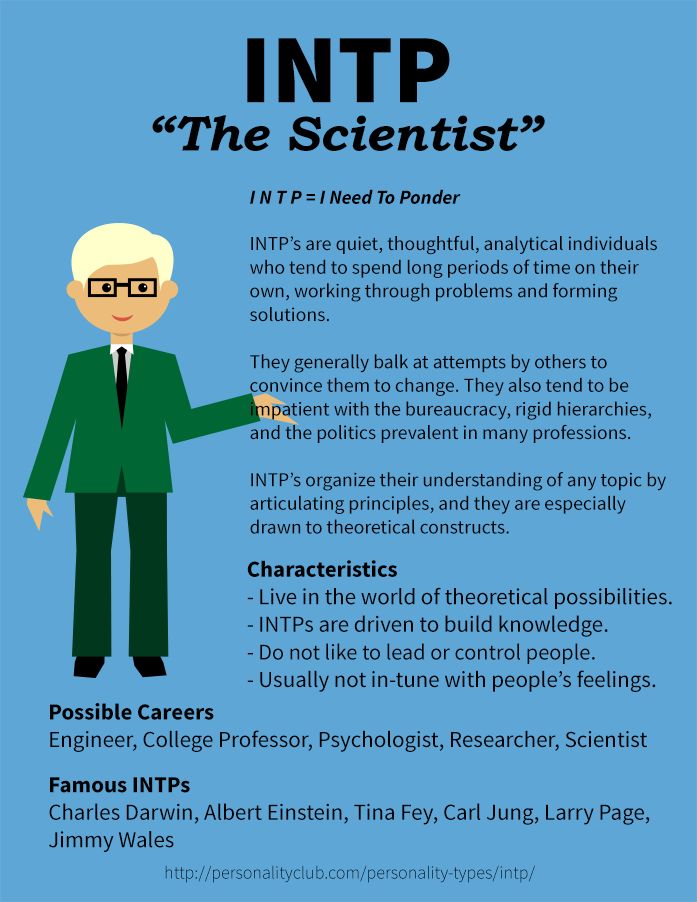Motto:
Always analytical (Source)
Description: (Source)
INTPs are quiet, thoughtful, analytical individuals who tend to spend long periods of time on their own, working through problems and forming solutions.
They are curious about systems and how things work. Consequently, they are frequently found in careers such as science, philosophy, law, and architecture.
![]()
INTPs tend to be less at ease in social situations or in the “caring professions”, although they enjoy the company of those who share their interests. They prize autonomy in themselves and others.
They generally balk at attempts by others to convince them to change. They also tend to be impatient with the bureaucracy, rigid hierarchies, and the politics prevalent in many professions.
INTPs have little regard for titles and badges, which they often consider to be unjustified. INTP’s usually come to distrust authority as hindering the uptake of novel ideas and the search for knowledge.
INTPs accept ideas based on merit, rather than tradition or authority.
They have little patience for social customs that seem illogical or that serve as obstacles for pursuing ideas and knowledge. This may place them at odds with people who have an SJ preference, since SJs tend to defer to authority, tradition, and what the rest of the group is doing.
INTPs prefer to work informally with others as equals.
INTPs organize their understanding of any topic by articulating principles, and they are especially drawn to theoretical constructs. Having articulated these principles for themselves, they can demonstrate remarkable skill in explaining complex ideas to others in simple terms, especially in writing.
On the other hand, their ability to grasp complexity may also lead them to provide overly detailed explanations of simple ideas, and listeners may judge that the INTP makes things more difficult than they need to be.
To the INTPs’ mind, they are presenting all the relevant information or trying to crystallize the concept as clearly as possible.
Given their independent nature, INTPs may prefer working alone to leading or following in a group.
During interactions with others, if INTPs are focused on gathering information, they may seem oblivious, aloof, or even rebellious–when in fact they are concentrating on listening and understanding.
However, INTPs’ extraverted intuition often gives them a quick wit, especially with language. They may defuse tension through comical observations and references.
They can be charming, even in their quiet reserve, and are sometimes surprised by the high esteem in which their friends and colleagues hold them.
INTP’s are driven to fully understand a discussion from all relevant angles. Their impatience with seemingly indefensible ideas can make them particularly devastating at debate.
When INTPs feel insulted, they may respond with sudden, cutting criticism. After such an incident, INTPs are likely to be as bewildered as the recipient. They have broken the rules of debate and exposed their raw emotions.
To INTPs, this is the crux of the problem: improperly handled emotions, INTPs believe, can only harm.
While INTP’s experience emotions as an important part of their internal lives, and sometimes share their emotions with others, INTP’s nevertheless believe that emotions must not play a role in logical discussions, or be expressed in a way that would put themselves at disadvantage.
Keirsey Temperament:
NT – Rationalist (What does this mean?)
Friendships:
Check the INTP Friendship experience.
Romantic Relationships:
Check the INTP Romantic Relationships.
Family Life:
Check the INTP Family Life and INTP as parent.
Education:
Check the INTP Education Experience.
Possible Careers:
Computer Programmer, Engineer, Professor, Psychologist, Researcher, Scientist (More).
For in depth analysis check the INTP Career Path.
Typing Confusions:
Check the INTP Typing Confusions.
Famous INTP’s:
Charles Darwin, Albert Einstein, Tina Fey, Carl Jung, Larry Page, Jimmy Wales (More)

Charles Darwin src

George Soros src

Elliot Page src

Thucydides src

Liam Gallagher src

M.I.A. src
Prayer:
“Lord, help me be less independent, but let me do it my way.”
Acronym:
I N T P = I Need To Ponder
Dominant Jungian function:
Introverted Thinking (Ti) – The ability to categorize ideas into logical systems and frameworks (What does this mean?)
Secondary Jungian function:
Extroverted Intuition (Ne) – The ability to recognize possibilities and patterns in real situations (What does this mean?)

This is so me.
Elliot Page is dead named here.
That should be fixed now. Thank you.
this sound just like me.